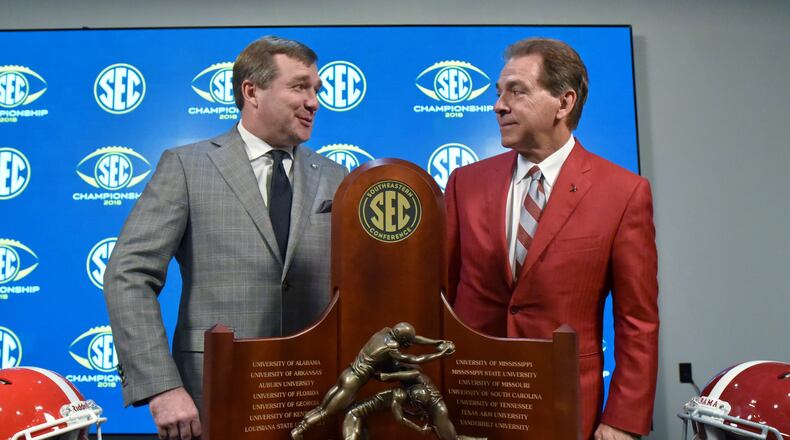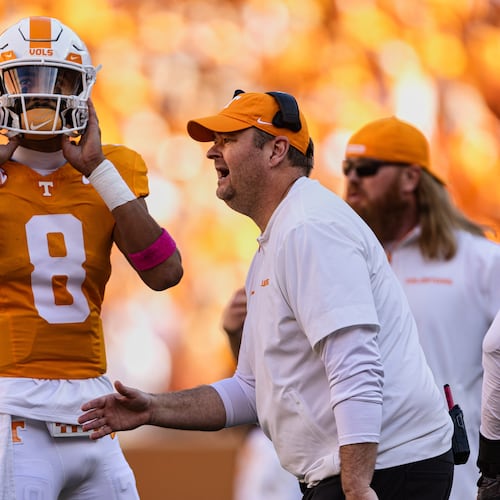Georgia desperately wanted to keep its 127-year-old rivalry with Georgia Tech intact. In the end, though, the Bulldogs were simply outnumbered when it came time for the SEC presidents to vote on a schedule format for the 2020 football season. They adopted the 10-game, conference-only format recommended by the league’s athletic directors. So, for the first time since Calvin Coolidge was president, the Yellow Jackets and Bulldogs won’t play a football game.
That was 1924, by the way.
“There are four of us who have ACC rivalries, but there are 10 others that don’t,” said Georgia Athletic Director Greg McGarity, speaking to reporters on a video-conference call an hour after the presidents unveiled their decision. “... It’s unfortunate, but it’s just the way everything fell. We’ll move forward and renew the rivalry next year.”
Tech and Georgia were to play Nov. 28 in Athens this year. The question now is whether they will play in Athens next year or in Atlanta as is currently scheduled. The Bulldogs have sought to switch home-and-away years with the Yellow Jackets in the past.
“I haven’t talked to Todd (Stansbury) yet,” McGarity said of Tech’s AD. “I’m sure we’ll have that discussion. We’ll see what we can do. ... We’ll take a look at it, but that’s something we don’t have to worry about now.”
Florida (FSU), Kentucky (Louisville) and South Carolina (Clemson) also had to give up rivalry games to ACC opponents to adhere to the new format. SEC teams this fall will play the five divisional opponents and two cross-divisional opponents on their previous schedules, then add two cross-division opponents to take the number of league games from eight to 10. The winners of each division will play in the SEC Championship game Dec. 19 at Mercedes-Benz Stadium.
The revised schedules will be announced at “a later date,” according to the SEC. Georgia already has Alabama and Auburn on its schedule from the West. The next two cross-divisional opponents for the Bulldogs in the current SEC rotation are Arkansas and Mississippi State.
The new format means Georgia will now play its season opener Sept. 26, rather than Sept. 7 versus Virginia. There will be two open dates for all teams within the season, and one Dec. 12.
The SEC’s decision came less than 24 hours after the ACC voted to play a 10-game conference schedule plus one non-conference game. The thought was Georgia and Tech, which play the last game of the season every year, would be able to preserve their series.
But the league’s presidents preferred to stick with only conference games for health and safety measures amid the unrelenting coronavirus pandemic.
“It was clear in our meeting today that this delay would be beneficial to our student-athletes and promote the safe and orderly return to campus for our student body in August,” UGA President Jere Morehead said in a statement released by UGA. “Having some separation between the earlier reopening of our campuses and the later start of the football season should be helpful.”
In addition to Tech, the Bulldogs will have to drop games against Virginia, East Tennessee State and Louisiana-Monroe from their schedule. UGA was scheduled to open the season against the Cavaliers on Sept. 7 -- Labor Day night – in a Chick-fil-A Kickoff game at Mercedes-Benz Stadium. But the ACC’s ruling Wednesday prevented its membership from playing non-conference opponents outside its state borders.
“(Virginia AD) Carla (Williams, a former UGA basketball player and administrator) and I spoke yesterday after the ACC vote and I said, ‘I want to make sure you know we’re not coming to Virginia,” McGarity quipped.
McGarity said they will attempt to reschedule displaced opponents. He was not sure whether they would honor guarantees made to East Tennessee State or Louisiana-Monroe. Georgia was contracted to pay those two teams $2.3 million to play in Sanford Stadium.
“I’ll let the lawyers tell us how to handle that,” he said.
Instead, Georgia will play four road games, five home games and one at a neutral site. McGarity said the Georgia-Florida game would remain in Jacksonville, though no one is sure yet what spectator limitations will be. McGarity said that eventually will be dictated to league members by the SEC office.
About the Author
Keep Reading
The Latest
Featured



